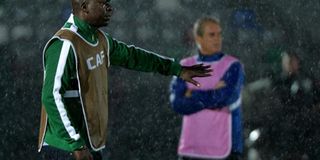Foreign coaches hold sway at Africa’s premier football tournament

Zambia's coach Honour Janza gestures during the 2015 African Cup of Nations group A football match between Cap Verde and Zambia, on January 26, 2015 in Ebebiyin. PHOTO | KHALED DESOUKI |
What you need to know:
- Foreign coaches hold sway at Africa’s premier football tournament and it shows at quarters stage
- Four of the men on the bench are French.
- Only DR Congo’s Ibenge is making the case for a local tactician in the quarters.
Most of those who believe in the Holy book will be familiar with a verse in Mark (6:4) that states: “Jesus said to them, a prophet is not without honour except in his own town, among his relatives and in his own home.”
How true that is for local coaches who are shunned at home by their very own national federations in preference to foreign tacticians.
This is best exemplified by the people in charge of teams at this year’s Africa Cup of Nations. Only three local coaches are handling their national teams.
The rest of the coaches are foreigners.
Only the governments and football associations of South Africa (Ephraim “Shakes” Mashaba), Zambia (Honour Janza) and the Democratic Republic of Congo (Florent Ibenge) had faith in home grown “prophets” to handle their national teams at the biennial sporting showpiece in Equatorial Guinea.
France is the most preferred country for most African countries in search of football coaches.
FRENCH LURE
Four of the men on the bench are French.
They are Claude Le Roy, who is in charge of Congo, Christian Gourcuff (Algeria), Herve Renard (Cote d’Ivoire) and Alain Giresse (Senegal).
Other foreign coaches handling teams at this tournament are Argentine Esteben Becker (Equatorial Guinea), the sole trainer from South America, Henry Kasperczack from Poland (Mali), the Portuguese duo of Jorge Costa and Rui Aguas (training Gabon and Cape Verde respectively), Belgians Paul Put and George Leekens (Burkina Faso and Tunisia respectively).
German Volker Finke (Cameroon), and Israeli Avram Grant (Ghana), a former coach of Chelsea football club in England, and arguably the most popular coach in the competition.
Equatorial Guinea FA president Andres Jorge Mbomio said they are normally forced to settle on foreign coaches because of their experience and fairness.
“Our case is unique. Our crop of players are from all over the world, who speak several languages and we thus look for a trainer who will understand them all and select the team without bias,” Mbomio told Sunday Nation Sport.
Nevertheless, selected results from the competition show that hiring a foreign man does help.
Of the eight teams that made the quarter-finals, seven where under foreign coaches with only DR Congo’s Ibenge making the case for a local tactician.
Le Roy has however rooted for the hiring of local coaches.





